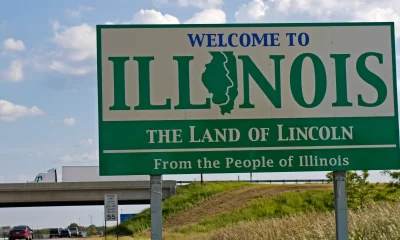Government
Bid To Get Legalization Initiative on Missouri Ballot ‘Isn’t Dead’ Yet

Early counts suggested that the Missouri campaign to legalize adult-use cannabis had fallen short of the necessary number of signatures to qualify.
Amid growing speculation that activists may have fallen short in their bid to get a cannabis legalization question on this year’s ballot in Missouri, a top official in the state said this week that the outcome is far from sealed.
“I can’t say without any certainty whether it will make it or not. It is in no way certain that they will fail. This isn’t dead,” Missouri Secretary of State Jay Ashcroft told the St. Louis Post-Dispatch.
Ashcroft’s office is reviewing hundreds of thousands of signatures submitted by Legal Missouri 2022, the group vying to get the question on this year’s ballot. If it were to pass, the initiative would legalize cannabis for Missouri adults aged 21 and older and establish a state-regulated marijuana market. It would provide a path for individuals in the state previously convicted of nonviolent pot-related offenses to have their records expunged.
But first, it must qualify for the ballot, and to do that, organizers “need signatures from 8% of the registered voters in six of the state’s eight congressional districts,” according to the Post-Dispatch. (That amounts to about 170,000 signatures total.)
The Associated Press reported that Legal Missouri “collected nearly twice the required number of signatures by mid-April, and it turned in more than 385,000 signatures” in early May.
But signs of trouble emerged earlier this week. Local television station KFVS reported on Tuesday that organizers had gathered a sufficient number of signatures in four congressional districts, but the count in the other four could come down to the wire.
Ashcroft’s office will make a final call on whether the initiative qualifies by August 9.
In the meantime, those involved with Legal Missouri are holding out hope.
“The Legal Missouri 2022 campaign continues to work to ensure that every valid voter signature is counted properly, and is excited that Missouri voters will soon have their opportunity to decide for themselves,” the group’s campaign manager, John Payne, told the St. Louis Post-Dispatch.
“Our close review of voter signature totals submitted to the state by counties shows that we have more than enough signatures to qualify our citizens’ initiative for the November general election ballot — and that some counties, due to a reliance on temporary workers, mistakenly rejected thousands of valid voter signatures. To be clear, this is not to suggest or imply any wrongdoing on the part of counties,” Payne continued.
Ashcroft himself did not rule out that possibility.
“There have been times in the past, when we went back and checked, we’ve found enough signatures,” Ashcroft said, as quoted by the Post-Dispatch.
Payne and other supporters of the initiative believe that the state’s previous embrace of medical cannabis, and the subsequent launch of that program, bode well for its chances this November.
In 2018, a large majority of Missouri voters approved an initiative that legalized medical pot for qualifying patients.
“Missourians now have confidence in our state government’s ability to operate a new division of state government that would regulate marijuana,” Legal Missouri says on its website. “The Department of Health and Senior Services has effectively administered the new program and met all guidelines set out by the Missouri Constitution.”
In addition to legalizing marijuana for adults and setting the framework for a regulated market, the initiative would also extend the “amount of time that medical marijuana patient and caregiver ID cards are valid from one to three years while keeping that cost low ($25),” according to Legal Missouri’s website. It would also reduce the $100 fee for patients who grow their own cannabis by 50%.
Source: https://hightimes.com/news/bid-to-get-legalization-initiative-on-missouri-ballot-isnt-dead-yet/
Business
New Mexico cannabis operator fined, loses license for alleged BioTrack fraud

New Mexico regulators fined a cannabis operator nearly $300,000 and revoked its license after the company allegedly created fake reports in the state’s traceability software.
The New Mexico Cannabis Control Division (CCD) accused marijuana manufacturer and retailer Golden Roots of 11 violations, according to Albuquerque Business First.
Golden Roots operates the The Cannabis Revolution Dispensary.
The majority of the violations are related to the Albuquerque company’s improper use of BioTrack, which has been New Mexico’s track-and-trace vendor since 2015.
The CCD alleges Golden Roots reported marijuana production only two months after it had received its vertically integrated license, according to Albuquerque Business First.
Because cannabis takes longer than two months to be cultivated, the CCD was suspicious of the report.
After inspecting the company’s premises, the CCD alleged Golden Roots reported cultivation, transportation and sales in BioTrack but wasn’t able to provide officers who inspected the site evidence that the operator was cultivating cannabis.
In April, the CCD revoked Golden Roots’ license and issued a $10,000 fine, according to the news outlet.
The company requested a hearing, which the regulator scheduled for Sept. 1.
At the hearing, the CCD testified that the company’s dried-cannabis weights in BioTrack were suspicious because they didn’t seem to accurately reflect how much weight marijuana loses as it dries.
Company employees also poorly accounted for why they were making adjustments in the system of up to 24 pounds of cannabis, making comments such as “bad” or “mistake” in the software, Albuquerque Business First reported.
Golden Roots was fined $298,972.05 – the amount regulators allege the company made selling products that weren’t properly accounted for in BioTrack.
The CCD has been cracking down on cannabis operators accused of selling products procured from out-of-state or not grown legally:
- Regulators alleged in August that Albuquerque dispensary Sawmill Sweet Leaf sold out-of-state products and didn’t have a license for extraction.
- Paradise Exotics Distro lost its license in July after regulators alleged the company sold products made in California.
Golden Roots was the first alleged rulebreaker in New Mexico to be asked to pay a large fine.
Source: https://mjbizdaily.com/new-mexico-cannabis-operator-fined-loses-license-for-alleged-biotrack-fraud/
Business
Marijuana companies suing US attorney general in federal prohibition challenge

Four marijuana companies, including a multistate operator, have filed a lawsuit against U.S. Attorney General Merrick Garland in which they allege the federal MJ prohibition under the Controlled Substances Act is no longer constitutional.
According to the complaint, filed Thursday in U.S. District Court in Massachusetts, retailer Canna Provisions, Treevit delivery service CEO Gyasi Sellers, cultivator Wiseacre Farm and MSO Verano Holdings Corp. are all harmed by “the federal government’s unconstitutional ban on cultivating, manufacturing, distributing, or possessing intrastate marijuana.”
Verano is headquartered in Chicago but has operations in Massachusetts; the other three operators are based in Massachusetts.
The lawsuit seeks a ruling that the “Controlled Substances Act is unconstitutional as applied to the intrastate cultivation, manufacture, possession, and distribution of marijuana pursuant to state law.”
The companies want the case to go before the U.S. Supreme Court.
They hired prominent law firm Boies Schiller Flexner to represent them.
The New York-based firm’s principal is David Boies, whose former clients include Microsoft, former presidential candidate Al Gore and Elizabeth Holmes’ disgraced startup Theranos.
Similar challenges to the federal Controlled Substances Act (CSA) have failed.
One such challenge led to a landmark Supreme Court decision in 2005.
In Gonzalez vs. Raich, the highest court in the United States ruled in a 6-3 decision that the commerce clause of the U.S. Constitution gave Congress the power to outlaw marijuana federally, even though state laws allow the cultivation and sale of cannabis.
In the 18 years since that ruling, 23 states and the District of Columbia have legalized adult-use marijuana and the federal government has allowed a multibillion-dollar cannabis industry to thrive.
Since both Congress and the U.S. Department of Justice, currently headed by Garland, have declined to intervene in state-licensed marijuana markets, the key facts that led to the Supreme Court’s 2005 ruling “no longer apply,” Boies said in a statement Thursday.
“The Supreme Court has since made clear that the federal government lacks the authority to regulate purely intrastate commerce,” Boies said.
“Moreover, the facts on which those precedents are based are no longer true.”
Verano President Darren Weiss said in a statement the company is “prepared to bring this case all the way to the Supreme Court in order to align federal law with how Congress has acted for years.”
While the Biden administration’s push to reschedule marijuana would help solve marijuana operators’ federal tax woes, neither rescheduling nor modest Congressional reforms such as the SAFER Banking Act “solve the fundamental issue,” Weiss added.
“The application of the CSA to lawful state-run cannabis business is an unconstitutional overreach on state sovereignty that has led to decades of harm, failed businesses, lost jobs, and unsafe working conditions.”
Business
Alabama to make another attempt Dec. 1 to award medical cannabis licenses

Alabama regulators are targeting Dec. 1 to award the first batch of medical cannabis business licenses after the agency’s first two attempts were scrapped because of scoring errors and litigation.
The first licenses will be awarded to individual cultivators, delivery providers, processors, dispensaries and state testing labs, according to the Alabama Medical Cannabis Commission (AMCC).
Then, on Dec. 12, the AMCC will award licenses for vertically integrated operations, a designation set primarily for multistate operators.
Licenses are expected to be handed out 28 days after they have been awarded, so MMJ production could begin in early January, according to the Alabama Daily News.
That means MMJ products could be available for patients around early March, an AMCC spokesperson told the media outlet.
Regulators initially awarded 21 business licenses in June, only to void them after applicants alleged inconsistencies with how the applications were scored.
Then, in August, the state awarded 24 different licenses – 19 went to June recipients – only to reverse themselves again and scratch those licenses after spurned applicants filed lawsuits.
A state judge dismissed a lawsuit filed by Chicago-based MSO Verano Holdings Corp., but another lawsuit is pending.
Source: https://mjbizdaily.com/alabama-plans-to-award-medical-cannabis-licenses-dec-1/
-

 Business2 years ago
Business2 years agoPot Odor Does Not Justify Probable Cause for Vehicle Searches, Minnesota Court Affirms
-

 Business2 years ago
Business2 years agoNew Mexico cannabis operator fined, loses license for alleged BioTrack fraud
-

 Business2 years ago
Business2 years agoAlabama to make another attempt Dec. 1 to award medical cannabis licenses
-

 Business2 years ago
Business2 years agoWashington State Pays Out $9.4 Million in Refunds Relating to Drug Convictions
-

 Business2 years ago
Business2 years agoMarijuana companies suing US attorney general in federal prohibition challenge
-

 Business2 years ago
Business2 years agoLegal Marijuana Handed A Nothing Burger From NY State
-

 Business2 years ago
Business2 years agoCan Cannabis Help Seasonal Depression
-

 Blogs2 years ago
Blogs2 years agoCannabis Art Is Flourishing On Etsy













